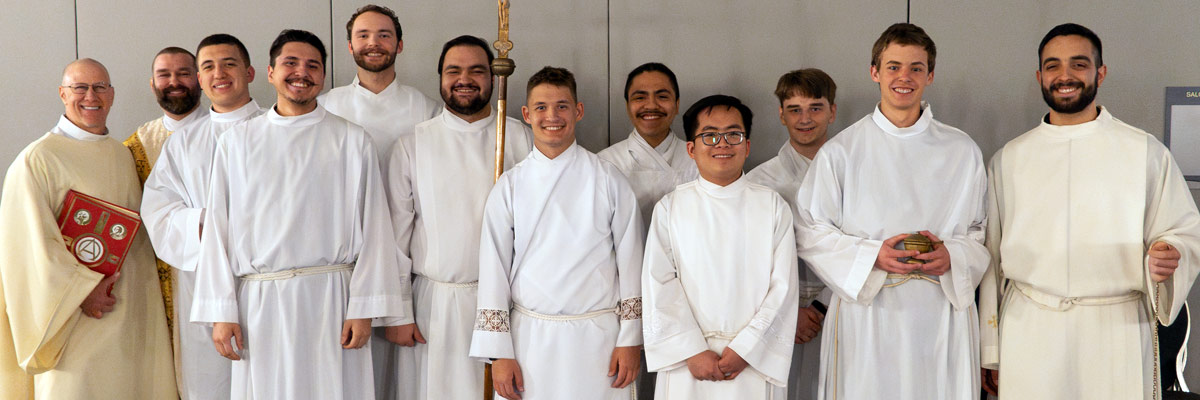Official Website of the
Catholic Diocese of Little Rock
Installation of Reader, Acolyte and Candidacy of Seminarians 2015
Published: December 19, 2015
Bishop Anthony B. Taylor preached the following homily during the Mass for the installation of reader, acolyte and candidacy for Diocese of Little Rock seminarians at Our Lady of Good Counsel Church in Little Rock on Saturday, Dec. 19, 2015.

Bishop Taylor
In our Mass today Jon Miskin and Tuyen Do will be installed as readers. Daniel Ramos, Stephen Elser, Joseph de Orbegozo, Keith Higginbotham, Patrick Friend and Robert Smith will be installed as acolytes, and Luke Womack, Daniel Ramos, Ramsés Mendieta, Stephen Hart, Michael Johns, William Burmester and Martin Siebold will receive candidacy in preparation for their ordination to the diaconate this coming May or June.
These ministries are received as part of our seminarians' formation for the priesthood, in which by virtue of ordination each of them will become an alter Christus, "another Christ," sharing in the salvific work of Christ in the world today. I would like to draw your attention today to what our second reading has to say about the salvific work of Christ in which they will be sharing in an extraordinary way as priests.
The author of the Letter to the Hebrews quotes and then expands upon a passage from the prophet Isaiah in order to answer this question: "Where does the salvific power of the sacrifice of Christ come from?" The answer is: from his complete abandonment of self to the Father.
In every Mass, we priests offer our own self in sacrifice to the Father along with that of Jesus, declaring to the Father — at least implicitly — that we too freely embrace the death to self that faithfulness to God requires.
By his total sacrifice of self — holding nothing back — Jesus accomplished what none of the bloody sacrifices of the
They fulfilled the outward requirements of the law, but because the victims were outside of themselves — animals offered in sacrifice — the effects were merely external and thus incapable of producing the inner effects — the holiness that truly sets us free from the power of sin and death.
After all, if the sacrifices of the old covenant could produce lasting inner effects, why did they have to keep repeating them over and over again? Isaiah says that God does not want offerings, sacrifices and holocausts if these don't serve to change our hearts. What God is looking for is the free sacrifice of ourselves.
The author of the Letter to the Hebrews is saying that in Jesus, God's complaint that "this people honors me with their lips but their heart is far from me" (Isaiah 29:13) has been answered.
The only sacrifice that gains for us God's forgiveness in a definitive way is the self-sacrifice of Christ; the
And by extension, the self-sacrifice of his body, the Church, and in an exceptional way, the redemptive role given to each of us priests. Though completely undeserving — each of us becomes an alter Christus — who by ordination has been given a privileged role in Christ's ongoing work of redemption.
In every Mass, we priests offer our own self in sacrifice to the Father along with that of Jesus, declaring to the Father — at least implicitly — that we too freely embrace the death to self that faithfulness to God requires.
My brothers who are about to be installed as readers, acolytes and candidates for the priesthood, faithfulness to the Lord requires that you make sure that the words of your lips reflect the true sentiments of your hearts.
Readers, you are about to be entrusted with the book of holy Scripture — make sure that the words you proclaim resonate in your heart. Acolytes, you are about to be entrusted with vessels containing the bread and wine to be consecrated — prepare yourself to offer your body and blood to the Father in union with that of Jesus.
And candidates, you pledge to "prepare yourselves in mind and spirit to give faithful service to Jesus and his body, the Church" — leading to the day this May or June when you will declare to all your "resolve to conform your way of life always to the example of Christ, of whose Body and Blood you will be a minister at the altar."




